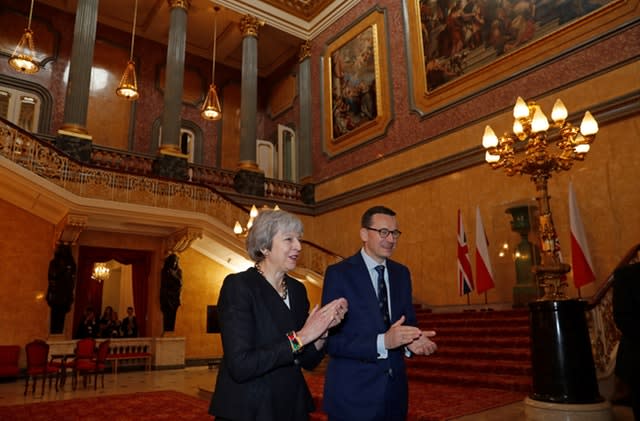UK to help set up anti-Russian disinformation unit in Poland, says PM
Britain is to help Poland tackle Russian “disinformation” with a new unit on Moscow’s doorstep, Theresa May has announced.
The Prime Minister hailed the eastern European nation’s support over the Salisbury nerve agent attack as she welcomed her counterpart Mateusz Morawiecki to London.
Senior Cabinet ministers met with their Polish counterparts on Thursday for the third annual UK-Poland inter-government consultation, which included discussions on defence and security links against the backdrop of concerns about Russia’s activities.
At a joint press conference at Lancaster House Mrs May reiterated that the attack, and subsequent cyber attacks on the Organisation for the Prohibition of Chemical Weapons (OPCW), were “unacceptable, and we will not stand for them”.
She said the countries had agreed to talk annually about “Russia’s hostile activity and closer collaboration between our defence and security services”.
She added: “We will also share our expertise to set up a new unit in Poland that directly counters Russian disinformation, and ensures quick attribution of hostile activity against state or commercial targets.”
The UK accused the GRU of carrying out the poisoning of ex-spy Sergei Skripal and his daughter Yulia with Novichok in Salisbury in March.
Russia has also been blamed for the death of 44-year-old Dawn Sturgess and the poisoning of her partner Charlie Rowley, who are believed to have come into contact with Novichok discarded by the Skripals’ attackers.

Mrs May added that the countries shared a desire for “a peaceful, stable Europe” but “we also recognise the same threats”, and would build on the defence and security co-operation treaty signed in Warsaw last year.
She added: “Our armed forces will work side by side on regular joint training exercises, and will increase maritime co-operation in the Baltic Sea, including naval visits.
“We also agree to continue to work together on Ground Based Air Defence systems, demonstrating our close defence partnership.
“Our security services will share expertise and intelligence to protect our people from serious organised crime, and prevent illegal activity across our borders.”

 Yahoo News
Yahoo News 
